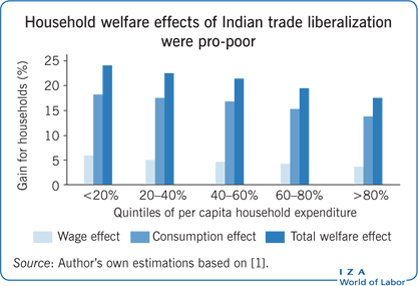Elevator pitch
Imported products tend to have lower prices than locally produced ones for a variety of reasons, including lower labor costs and better technology in the exporting country. The reduced prices may lead to wage losses for individuals who work in the production of a local version of the imported item. On the other hand, lower prices may be beneficial to households if the cheaper product is in their consumption basket. These welfare gains through consumption, on average, are found to be larger in magnitude than the wage effect for some developing countries.
Key findings
Pros
International trade tends to reduce the prices of consumption goods, creating welfare gains for consumers in importing countries.
Welfare gains through reduced costs of consumption may be larger than gains or losses through income changes.
In developing countries, the welfare effect of unilateral trade liberalization through consumption tends to be pro-poor.
Welfare gains from trade are larger for households that live in urban areas and that are closer to national borders.
Households that participate in the production of exported products may experience further welfare gains in addition to gains through cheaper consumption goods.
Cons
Earnings may be reduced depending on an individual’s skill level and the impacted industry’s level of exposure to international trade.
Income effects can be pro-rich if agricultural wages decline due to trade liberalization.
Welfare gains through consumption are expected to be pro-poor only if the cheaper imports are relatively important in poor households’ budgets.
Welfare gains through consumption may be smaller for households that are isolated from price effects due to low competition in their region.
Households with skilled labor may experience smaller welfare gains in developing countries.
